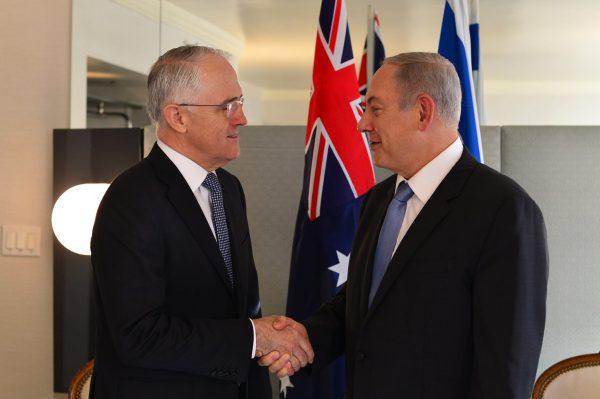Australia–Israel relations: looking beyond Beersheba
Posted By Anthony Bergin on October 27, 2017 @ 11:00

Next Tuesday, the Australian and Israeli prime ministers, along with thousands of Australians and New Zealanders, will gather in Beersheba to commemorate the 100th anniversary of the Battle of Beersheba.
The charge by the Australian 4th and 12th Light Horse Regiments on 31 October 1917 was part of the wider allied offensive known as the third battle of Gaza. The Battle of Beersheba had qualities that make it truly heroic: the tactical use of surprise, the bond between a man and his horse, and a do-or-die charge across the desert that ended in victory.
Malcolm Turnbull’s first official visit to Israel comes after Benjamin Netanyahu’s visit to Australia in February this year. Netanyahu is the first sitting Israeli prime minister to visit Australia. Increasingly, the two countries are recognising that their shared strategic interests go beyond resolving the complex Palestinian issue.
It’s expected that Turnbull will visit Ramallah, which would send a useful message of Australia’s commitment to a two-state solution.
Next week the two leaders are likely to canvass a number of issues. In the area of defence, attention may be given to long overdue opportunities to enhance exchanges between our defence agencies.
Unlike with other countries, Australia has had few high-level military exchanges with Israel, and neither country sends officers to study at the other’s military staff colleges. And the Australian defence attaché to Israel is based in Turkey.
On national security, the two leaders will likely discuss ways to strengthen cooperation in counterterrorism. That could range from sharing information on terrorist financing and foreign fighters, to the connections between Middle East terrorism and trends in violent Islamist extremism in Asia.
During his visit to Australia, Netanyahu said [1] that both states had ‘superb intelligence services’ which could be better if they worked more closely together to counter violent Islamist extremism. So, intelligence cooperation may also be on the leaders’ agenda.
As our countries face increased cyberattacks, both prime ministers are likely to be examining ways to promote national capabilities in cyberspace. The Turnbull government has recently released an international cyber engagement strategy.
Israel has become one of the world’s top powers in cybersecurity. As we enter the age of the ‘internet of things’, the need for cybersecurity will grow. The Commonwealth Bank has an agreement [2] for collaboration with Israel’s Office of the Chief Scientist on cybersecurity.
In increasing its efforts to defeat cybercriminals, the Australian government has directed the Australian Signals Directorate to use its offensive cyber capabilities to disrupt, degrade, deny and deter organised offshore cybercriminals.
Israel’s intelligence agencies also play both defensive and offensive roles when it comes to threats in the online world. The head of Israel’s domestic security agency, Shin Bet, recently said [3] that ‘hackers experience unexpected errors when trying to target Israel’.
Another area that’s likely to be discussed is the innovation agenda. Israel has one of the highest concentrations of start-ups in the world, and Australia is looking to learn from Israel about how to create more of a start-up culture.
At the same time, more and more new Israeli companies are being listed on [4] the Australian Stock Exchange. Australia provides an excellent point of entry into Asian markets for Israeli high-tech companies, and the innovation ties between Australia and Israel look set to grow.
The two countries signed an agreement this year on cooperation in technological innovation and research to facilitate joint innovation projects. The agreement builds on the newly established innovation ‘Landing Pad [5]’ in Tel Aviv that’s designed to boost our innovation system.
The Australian prime minister may be keen to hear the Israeli leader’s views on President Donald Trump’s recent decision not to certify the nuclear deal with Iran and the White House’s stated concerns about other aspects of Iran’s behaviour, such as its ballistic-missile program, support for terrorism, and broader regional ambitions. Also, he might ask whether Israel thinks there’s any connection between Iran and North Korea, and more broadly whether there are ways to strengthen, rather than do away with, the Iran nuclear deal.
Other possible areas for discussion include concluding a double taxation agreement to remove tax impediments to bilateral economic activity and opportunities for future collaboration in agriculture, water, energy, and oil and gas.
While he’s in Israel, Turnbull will address the third ASPI – Begin Sadat Centre Beersheba Dialogue, which is designed to develop a greater appreciation of how Australia and Israel can work together on areas of common strategic interest.
Beyond the focus on Australia’s first big military achievement on the world stage, it’s to be hoped that Malcolm Turnbull’s trip will be judged a success by both sides.
Article printed from The Strategist: https://aspistrategist.ru
URL to article: /australia-israel-relations-looking-beyond-beersheba/
URLs in this post:
[1] said: http://www.theaustralian.com.au/national-affairs/foreign-affairs/colour-me-aussie-netanyahu-tells-the-faithful/news-story/0a200c57de631df2eb79cef41605ca07
[2] an agreement: http://www.smh.com.au/business/banking-and-finance/cba-signs-startup-deal-with-israels-chief-scientist-20151123-gl5qy4.html
[3] said: https://www.ynetnews.com/articles/0,7340,L-4981468,00.html
[4] being listed on: http://www.theaustralian.com.au/business/companies/israels-mobilicom-technology-startup-lists-on-asx/news-story/0537b30ca08ea003da383c0dd26f6796
[5] Landing Pad: https://www.australiaunlimited.com/landingpads/locations/tel-aviv
Click here to print.